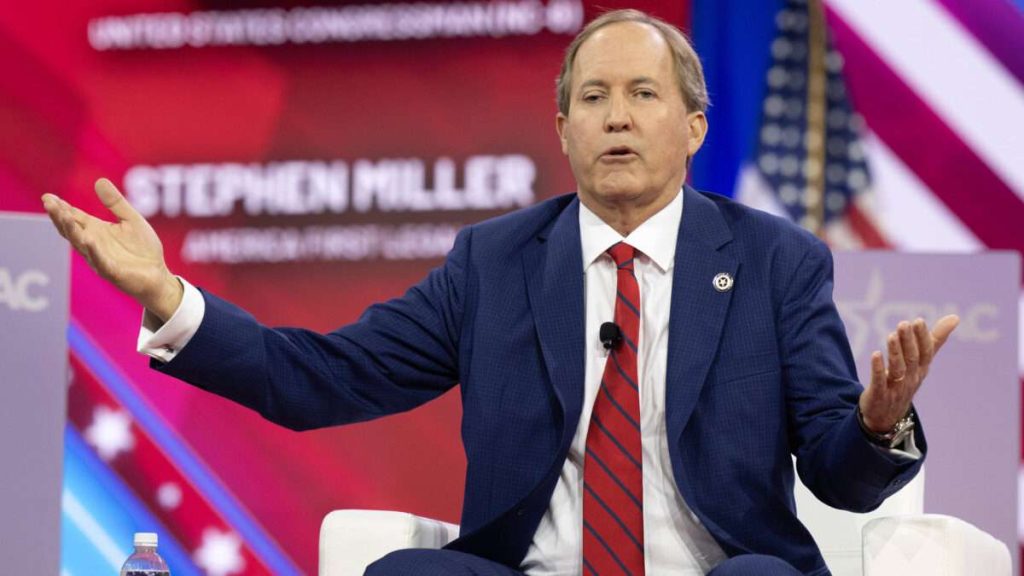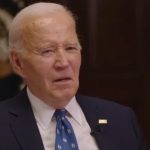Next month, the Supreme Court will consider whether to take up Villarreal v. Alaniz, a First Amendment case involving a Laredo, Texas, journalist who was arrested for asking questions. Although that is literally what happened to local crime vlogger Priscilla Villarreal in 2017, Texas Attorney General Ken Paxton, echoing an appeals court ruling against her, calls that description “clever but misleading” in a brief opposing her petition for Supreme Court review.
“Priscilla Villarreal was supposedly arrested just for asking questions,” the brief says. In reality, Paxton argues, she was arrested for soliciting the commission of a crime: the unauthorized release of information about a public suicide and a fatal car accident. Villarreal asked Laredo police officer Barbara Goodman to confirm information about those incidents, and Goodman willingly did so. According to Laredo police and local prosecutors, the text messages that Villarreal exchanged with Goodman constituted two felonies under an obscure and abstruse Texas statute addressing “misuse of official information.”
Paxton’s framing aims to avoid the obvious First Amendment implications of criminalizing basic journalism. He argues that the U.S. Court of Appeals for the 5th Circuit was right to rule that the Laredo officials responsible for Villarreal’s arrest were protected by qualified immunity, a doctrine that bars federal civil rights claims unless they allege violations of “clearly established” law. In a January 2024 decision, Judge Edith Jones concluded that arresting Villarreal for seeking information from Goodman was not “obviously unconstitutional.”
That assessment provoked four vigorous dissents authored or joined by seven of Jones’ colleagues. “If the First Amendment means anything,” Judge James C. Ho wrote, “surely it means that citizens have the right to question or criticize public officials without fear of imprisonment.” The decision also dismayed civil libertarians and journalists across the country, who recognized the threat it posed to freedom of speech and freedom of the press. Villarreal’s Supreme Court petition, which the Foundation for Individual Rights and Expression (FIRE) filed in April, has attracted supporting briefs from an ideologically diverse set of organizations and individuals (including me). The briefs emphasize the chilling impact of letting police punish people for doing what reporters do every day: seek and publish information from government sources.
According to Paxton, however, there is nothing to see here. Dismissing “the doomsday scenario predicted by the [5th Circuit] dissents and adopted by Villarreal,” he tries to obscure what happened to her by describing her questions as “akin to incitement.” Without taking a position on whether Villarreal should have been arrested, he argues that it was reasonable for Laredo police to think she had broken the law and that, even if applying it in this situation was unconstitutional, they had no way of knowing that.
Both of those arguments are highly dubious. Let’s start with the claim that the cops reasonably believed Villarreal had committed crimes.
A judge dismissed the charges against Villarreal after concluding that the law on which the cops relied, Section 39.06(c) of the Texas Penal Code, was unconstitutionally vague. It is not hard to see why.
Under Section 39.06(c), “a person commits an offense if, with intent to obtain a benefit or with intent to harm or defraud another, he solicits or receives from a public servant information that…the public servant has access to by means of his office or employment” when that information “has not been made public.” Seven years after Villarreal’s arrest, Laredo officials still have not satisfactorily explained exactly how her conduct fit the elements of that offense.
The Texas Penal Code defines “benefit” as “anything reasonably regarded as economic gain or advantage.” What “benefit” did Villarreal allegedly seek to obtain by asking Goodman about the suicide and the accident? According to the arrest affidavits, the benefit was a boost to traffic on the locally popular Facebook page where she posted her video reports. In the past, Jones noted, Villarreal also had received “free meals ‘from appreciative readers,’ ‘fees for promoting a local business,’ and ‘donations for new equipment necessary to her citizen journalism efforts.'”
This understanding of “benefit” is broad enough to encompass any journalist who receives any sort of compensation for his work or who hopes to attract readers or viewers. In other words, it is broad enough to encompass any journalist.
That was not the only problem with the legal theory on which Laredo police relied to arrest Villarreal. Section 39.06(d) defines “information that has not been made public” as “any information to which the public does not generally have access” that is also “prohibited from disclosure” under the Texas Public Information Act (TPIA). On its face, that definition renders this provision a nullity.
As the 4th District Court of Appeals noted in two 2005 cases, State v. Newton and State v. Ford, the TPIA does not “prohibit the disclosure of any information; rather, it provides a set of exceptions to required disclosure for certain categories of public information.” It is therefore “readily apparent that the terminology used in the penal statute does not match the terminology” used in the TPIA. “In order to give meaning to the penal statute,” the court read “prohibited from disclosure” to mean exempt from mandatory disclosure, which is by no means the same thing.
The TPIA includes exceptions for more than 60 categories of information. In some cases, that information is confidential under other statutes. But the TPIA itself does not “prohibit” the disclosure of anything, and in many cases it gives agencies the discretion to disclose information that is arguably covered by an exception. For example, law enforcement agencies are not required to release information when doing so might compromise an ongoing criminal investigation. But they may choose to release that information anyway.
The 4th District’s interpretation of Section 39.06(d), in short, is at odds with the plain meaning of “prohibited.” The 8th District Court of Appeals nevertheless adopted that interpretation in the 2013 case Tidwell v. State. “If the two statutes are construed literally and without any attempt to harmonize them, the second component of Section 39.06(d) could never be satisfied and no one could ever be prosecuted or convicted under Section 39.06(c),” the court reasoned. “This is contrary to the rules of statutory construction which require a court to construe statutory provisions in a manner that avoids illogical or absurd results.”
Alluding to those decisions, Paxton’s brief says “Texas state courts have held that information ‘prohibited from disclosure’ refers to the exceptions to disclosure in the PIA.” Yet that position contradicts the interpretation that Paxton’s office embraced when Villarreal’s case was considered by the 5th Circuit.
“Texas courts have held that the distinction between exceptions and outright
prohibitions on disclosing information is irrelevant for purposes of section 39.06(c),” Jones said in the majority opinion. But as Ho noted in his dissent, Paxton’s office “disagrees with the majority,” taking the position that “only outright prohibitions on disclosure—and not discretionary exceptions—would trigger § 39.06(c).”
Notably, the arrest affidavits in Villarreal’s case did not explain which “exceptions” or “outright prohibitions” covered the information that she obtained, which included the last name of the family involved in the car accident and the name and occupation of a man who had killed himself by jumping off a bridge in Laredo. In her majority opinion, Jones tried to fill in that blank.
“The state has a longstanding policy to protect individual privacy in law enforcement situations that appear to involve suicide or vehicular accidents,” Jones wrote. “Recently, the Texas Attorney General has stated that under the Texas Constitution, ‘surviving family members can have a privacy interest in information relating to their deceased relatives.’…Because Texas law protects the privacy of the bereaved family, the identity of a suicide or a deceased car accident victim may be considered confidential, especially when a law enforcement investigation has just begun or is ongoing….Texas law prevents the disclosure of certain personal identifying information of victims in accident reports and exempts disclosure of information related to ongoing criminal investigations.”
None of this information is “prohibited from disclosure” under the TPIA. The restrictions on accident reports, which are imposed by a different statute, allow access by a long list of interested individuals and organizations, including news outlets. The exception for “information related to ongoing criminal investigations” is discretionary.
A brief from the Laredo officials whom Villarreal sued avers that “Texas law ‘prohibits disclosure’ by public servants of various types of sensitive information,” such as “information that may ‘interfere with the detection, investigation, or prosecution of crime,'” “reports about traffic accidents,” and “records concerning children.” The respondents add that “Section 39.06(c) criminalizes solicitation intended to induce a public official to violate those restrictions.”
Again, the TPIA does not “prohibit disclosure” of information about an investigation. It merely says disclosure is not required in certain circumstances. The law regarding accident reports makes many exceptions, including for members of the press. The law dealing with “records concerning children” that the respondents cite addresses information regarding abuse or neglect investigations. It is not clear why they think that statute is relevant to the information that Villarreal obtained from Goodman.
The officials who engineered Villarreal’s arrest, in short, did not initially explain how she supposedly had violated Section 39.06(c). And to this day, their explanations fall short of justifying the arrest, even without considering the First Amendment implications. If the cops and prosecutors still cannot settle on a specific legal theory, how was Villarreal supposed to know she was breaking the law?
Laredo’s broad interpretation of Section 39.06(c) poses a problem for Paxton because it implies that anyone who asks for information deemed to be covered by a TPIA exception is committing a felony when he can be said to be seeking a “benefit.” That happens thousands of times a year in Texas: Someone seeks information that an agency does not want to release, and it asks the attorney general’s office for an opinion to back up that position. As the MuckRock Foundation notes in its brief supporting Villarreal’s Supreme Court appeal, Laredo’s reading of Section 39.06(c) would lead to “the absurd result of imposing liability not only on those who seek ‘confidential’ information, but on those who request information that the government may, but need not, make public.”
Paxton is keen to avoid that “absurd result.” Since the TPIA “encourages individuals to ask for information,” he says, it is “highly unlikely that a Texas court would conclude that merely asking for information that ultimately cannot be released is a crime.”
Villarreal’s case is different, the Laredo officials argue, because she did not go through the proper channels. “Texas law establishes a careful structure for obtaining information from government bodies,” they say. “These procedures protect the substantial government interest in ensuring both that the government promptly discloses information that should be disclosed and that it does not disclose confidential information protected from disclosure. Soliciting information from a government official that the official may not lawfully disclose circumvents the legitimate structure requiring inquiries to be directed through the public information officer.”
By this account, a Texas reporter risks arrest whenever he talks to a “back-channel” police source instead of a “public information officer.” If the information he seeks is deemed exempt from mandatory disclosure under the TPIA, he is committing a felony. Contrary to Paxton’s assurances, this understanding of Section 39.06(c) clearly criminalizes standard reporting practices, making it illegal to ask questions.
Although Paxton implies that Villarreal encouraged Goodman to break the law, the officer was not charged with a crime. Instead, she was suspended for 20 days after her interactions with Villarreal came to light. If Goodman was not authorized to disclose the information she gave Villarreal, FIRE argues in its reply brief, that’s on her: “Disciplining the employee, not the inquiring citizen, is the state’s only constitutionally permissible path.”
Paxton “tries relabeling asking police for facts with criminal buzzwords like ‘solicitation,” ‘incitement,’ and ‘leaks,'” FIRE notes. “The First Amendment is not so easily evaded: ‘[A] State cannot foreclose the exercise of constitutional rights by mere labels.'”
Like the 5th Circuit, “Respondents and Texas miscast this case as one about ‘access’ to government information,” FIRE says. “It is not. If it were, neither would scramble
to mislabel Villarreal’s polite questions to a police officer with scare-words like ‘soliciting’ and ‘inciting.’ No matter the government label, the First Amendment protects obtaining information from officials ‘simply by asking.'”
The post A Texas Reporter Was Arrested for Asking Questions. The State Says That’s No Big Deal. appeared first on Reason.com.







